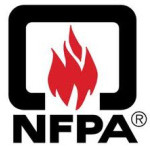- Industry: Fire safety
- Number of terms: 98780
- Number of blossaries: 0
- Company Profile:
Established in 1896, NFPA's mission is to reduce the worldwide burden of fire and other hazards on the quality of life by providing and advocating consensus codes and standards, research, training, and education.
Agents that provide unique extinguishing capability beyond the primary chosen agent.
Industry:Fire safety
Agents that have the capability of suppressing and preventing the reignition of fires in liquid hydrocarbon fuels.
Industry:Fire safety
Agents that are complementary agents including halocarbons and halons.
Industry:Fire safety
After an aircraft accident/incident, it is imperative that investigative evidence be preserved after life safety and rescue operations have been concluded.
Industry:Fire safety
Aerosol cans packaged in at least a single layer of corrugated cardboard. The cardboard must cover at least the top, bottom, and two complete sides of the unit. The two other sides must be at least 60 percent covered.
Industry:Fire safety
Aerosol cans packaged in at least a single layer of corrugated cardboard where the top and parts of the face and sides of the carton have been removed for retail sales.
Industry:Fire safety
Aerosol cans arranged on slip sheets or trays shrink-wrapped together in packs on a pallet or packaging that does not meet the definition of cartoned.
Industry:Fire safety
Adsorptive carbon particles or granules usually obtained by heating carbonaceous material in the absence of air or in steam and possessing a high capacity to selectively remove trace and soluble components from solution.
Industry:Fire safety
As applied to equipment, admitting close approach; not guarded by locked doors, elevation, or other effective means.
Industry:Fire safety
Admission of air to the underside of a grate from the sides of a chain or traveling grate stoker.
Industry:Fire safety
